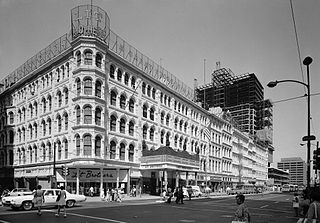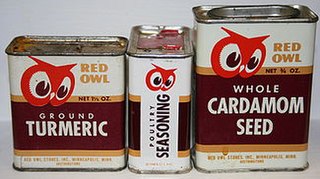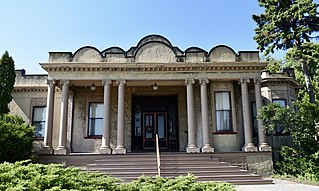
Hy-Vee, Inc. is an employee-owned chain of supermarkets in the Midwestern and Southern United States, with more than 280 locations in Iowa, Illinois, Kansas, Minnesota, Missouri, Nebraska, South Dakota, Wisconsin, with stores planned in Indiana, Kentucky, Tennessee, and Alabama. Hy-Vee was founded in 1930 by Charles Hyde and David Vredenburg in Beaconsfield, Iowa, in a small brick building known as the Beaconsfield Supply Store, which is listed on the National Register of Historic Places.

Younkers Inc. is an American online retailer and former department store chain founded as a family-run dry goods business in 1856 in Keokuk, Iowa. The retailer had evolved over more than 150 years to include a presence in locations throughout Iowa and bordering states in the Midwest region of the United States. It is pronounced yong-kers. Younkers became influential as it acquired several rivals throughout the 20th century both inside and outside of Iowa. The chain itself was sold by the late 1990s, with ownership transferring out of state, and its Des Moines-based headquarters closed by 2003 as a part of a corporate consolidation. Following its last sale in 2006, Younkers operated as a subsidiary of The Bon-Ton, with locations in seven Midwestern states, primarily in shopping malls. As of 2013 the chain operated more than fifty locations in the region. On August 29, 2018, Younkers closed its doors one last time.

Wanamaker's, originally known as John Wanamaker Department Store, was one of the first department stores in the United States. Founded by John Wanamaker in Philadelphia in 1861, it was influential in the development of the retail industry including as the first store to use price tags.

Gimbel Brothers was an American department store corporation that operated for over a century, from 1842 until 1987. Gimbel patriarch Adam Gimbel opened his first store in Vincennes, Indiana, in 1842. In 1887, the company moved its operations to the Gimbel Brothers Department Store in Milwaukee, Wisconsin. It became a chain when it opened a second, larger store in Philadelphia, Pennsylvania, in 1894, moving its headquarters there. At the urging of future company president Bernard Gimbel, grandson of the founder, the company expanded to New York City in 1910.
Ben Franklin is a chain of five and dime and arts and crafts stores found primarily in small towns throughout the United States, currently owned by Promotions Unlimited of Mount Pleasant, Wisconsin. They are organized using a franchise system, with individual stores owned by independent proprietors. It was perhaps the first retail franchise, starting in 1927. They are named after Benjamin Franklin, taking a cue in their merchandise offerings from Franklin's saying, "A penny saved is a penny earned."

Blain Supply, Inc., doing business as Blain's Farm & Fleet, is a regional chain of 46 retail stores in Wisconsin, Illinois, Iowa and Michigan. Blain's Farm & Fleet was an early adopter of "buy online, pick up at the store" in which all stores provide a drive-thru pick-up experience so online orders can be retrieved without consumers having to leave the car.

Gamble-Skogmo Inc. was a conglomerate of retail chains and other businesses that was headquartered in St. Louis Park, Minnesota. Business operated or franchised by Gamble-Skogmo included Gambles hardware and auto supply stores, Woman's World and Mode O'Day clothing stores, J.M. McDonald department stores, Leath Furniture stores, Tempo and Buckeye Mart Discount Stores, Howard's Brandiscount Department Stores, Rasco Variety Stores, Sarco Outlet Stores, Toy World, Rasco-Tempo, Red Owl Grocery, Snyder Drug and the Aldens mail-order company. In Canada, retail operations consisted of Macleods Hardware, based in Winnipeg, Manitoba, and Stedmans Department Stores, based in Toronto, Ontario. Gamble-Skogmo carried a line of home appliances, including radios, televisions, refrigerators, and freezers, under the Coronado brand name.
Gee Bee Department Stores was a chain of discount department stores, mostly throughout western Pennsylvania. It was established as Glosser Brothers in 1906. The chain went out of business in 1993.

Lit Brothers was a moderately-priced department store based in Philadelphia. Samuel and Jacob Lit opened the first store at Market and N. 8th streets in 1891. Lits positioned itself well as a more affordable alternate to its upscale competitors Strawbridge and Clothier, John Wanamaker, and Gimbels. The store's slogan was "A Great Store in A Great City," and it was noted for its millinery department.

The Main Street Historic District in Fort Atkinson, Wisconsin, United States, was placed on the National Register of Historic Places in 1984. The district is composed of 51 buildings on or within a block of Main Street.

Red Owl was a grocery store chain in the United States, headquartered in Hopkins, Minnesota. Founded in 1922, it was initially owned and operated by a private investment firm affiliated with General Mills, and purchased in 1968 by Gamble-Skogmo.

This is a list of the National Register of Historic Places listings in Marinette County, Wisconsin. It is intended to provide a comprehensive listing of entries in the National Register of Historic Places that are located in Marinette County, Wisconsin. The locations of National Register properties for which the latitude and longitude coordinates are included below may be seen in a map.

The J.H.C. Petersen's Sons' Store also known as the Petersen Harned-Von Maur Store Building and the Redstone Building, is a historic building in Davenport, Iowa, United States. It was individually listed on the Davenport Register of Historic Properties and on the National Register of Historic Places. In 2020 it was included as a contributing property in the Davenport Downtown Commercial Historic District. The former department store building was modeled on the Rookery Building in Chicago.

Neillsville Downtown Historic District is a section of the historic old downtown of Neillsville, Wisconsin, with buildings as old as 1872. It was added to the National Register of Historic Places in 2000.

The Bijou Theatre Building is located in Marinette, Wisconsin, USA. It was added to the National Register of Historic Places in 1993.

The Court Street Commercial Historic District is a largely intact part of the old downtown of Richland Center, Wisconsin. It was added to the National Register of Historic Places in 1989 - a 11.2 acres (4.5 ha) historic district which included 51 contributing buildings and 20 non-contributing ones. The buildings are commercial, mostly in Late Victorian styles constructed from 1870 to 1938. Most are brick two-story buildings; a few one-story and three-story brick buildings are interspersed.

The South Main Street Historic District a fairly intact remnant of Janesville, Wisconsin's old downtown east of the Rock River, built in the 19th and early 20th centuries. In 1990 the district was added to the National Register of Historic Places.

Angeli Foods, also known as Angeli's Central Market or Angeli's Super Valu, was an American grocery store chain founded in Iron River, Michigan. Italian immigrant Alfred Angeli opened the first store in 1917, and the company grew to encompass several locations dotted across the Upper Peninsula of Michigan. Angeli Foods remained under family ownership for three generations until its sale in 2022.

The F. J. Lauerman House also known as Casa de las Floras is house located in Marinette, Wisconsin. It was added to the National Register of Historic Places on August 14, 1979.



















